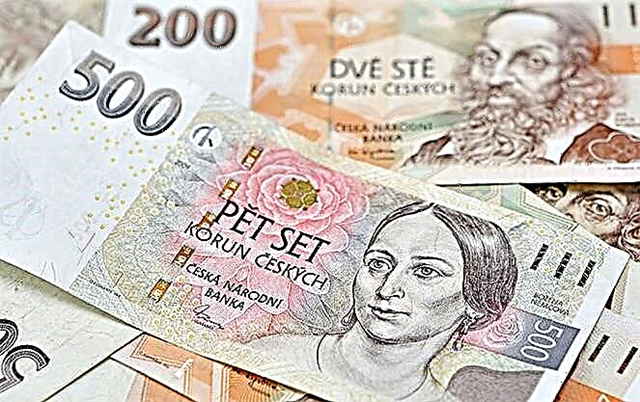Quite a lot of our compatriots live and work on the territory of the Czech Republic. They buy their own housing, cars, household appliances and electronics there, so they are often forced to take out loans. But are loans available in the Czech Republic to foreigners in 2021? At the moment, citizens of other countries who do not have Czech citizenship can indeed take out loans from local banks. Only at the same time they must comply with the established rules and meet certain requirements. True, the very procedure for issuing a loan here is somewhat different from the usual one for Russians. Banks in the Czech Republic are considered one of the most reliable in Europe, so it is worthwhile to figure out what lending opportunities are available to foreigners in this country.

What types of loans are offered by Czech banks
Czech banks are trying to meet European standards and issue loans on good terms not only to their fellow citizens, but also to foreigners. The most popular types of loans are the following:
- Consumer loans. Under the terms of such programs, borrowers are given about 500 thousand kroons. At the same time, you do not need to report on what you will spend the money on - the main thing is that the foreigner has a residence permit in the country. The debt can be repaid for a maximum of 28 years, with the annual interest rate starting at 4.5%. Moreover, during the first two years, the borrower pays the lender 0.5% of the borrowed amount.
- Microcredits in non-banking organizations. At the moment, this is the most demanded type of lending in the Czech Republic. The loan amount is usually small and available to absolutely everyone. You need to give loans quickly, and the interest rate is very high. But you can even get such a loan by phone.
- Mortgage loans. Issued for the purchase of real estate. At the same time, most banks are not too worried about the fact that their client is a citizen of another country. The main thing is to confirm your solvency, because large amounts are issued for this type of loan. In addition, in case of non-payment of the loan, the bank can easily take away the purchased housing, thereby minimizing its risks.
Why are consumer loans interesting?
Personal credit is one of the most popular types of lending in the country. It is issued for the needs of the client and at the same time does not require strict reporting on what this money will be spent on. That is, the borrower can pay for a wedding, go on vacation, buy a laptop - in general, spend them as he wants.
As a rule, for the repayment of such a loan, a period of no more than 3-4 years is provided. The amount of interest depends on the bank from which the money was taken, but not more than 4.5% per annum + 0.5% every month for the first year / two.
The objects of consumer lending can be:
- urgent needs - this category includes the payment of bills for treatment, training, travel, repairs, etc .;
- goods - usually money is given out for the purchase of goods with a long service life. These include cars, furniture, household appliances and electronics;
- housing - for example, you can borrow money from a bank for construction.
Take a sociological survey!
Conditions for issuing loans for Czechs and foreigners
The bank can issue a loan only to adult, solvent citizens. In addition, when issuing money, banks require some kind of guarantee that these funds will be returned. That is why the practice of pledge and surety is so popular in Czech banking institutions.
Some kind of inventory acts as collateral, and if the borrower for some reason does not repay the loan, the bank automatically becomes the primary applicant for compensation.
For foreigners, credit conditions are slightly different. A resident of another country must first of all present a permanent residence permit in the Czech Republic (trvalý pobyt). But this is not enough - it is necessary that the period specified in this permit be longer than the time allotted by the bank to pay off the loan.
In addition, the borrower must have a permanent Czech employer or so that his income is provided by doing business in the Czech Republic.
Detailed instructions on what types of enterprises can be registered in the Czech Republic, what documents are required for this and the advantages of buying a ready-made business will be informed in the article “How to open a business in the Czech Republic on your own”.
At what interest and how much are loans issued
Loans in the Czech Republic have fallen in price not so long ago. Previously, interest rates were at least 11%, but today you can take out a loan at 6% per annum, and in some cases even at 4.5%.
| Bank | Interest rate | Term |
|---|---|---|
| Česká spořitelna | 3.99-4.99% interest rate fixing up to 20 years | Up to 30 years old |
| Komerční banka | 4% with fixation up to 10 years | 5 to 30 years old |
| Hypoteční banka | 4.39% with a fixation period of 3 years | Up to 30 years old |
| UniCredit Bank | 4,0 % | 1 to 30 years old |
| Sberbank CZ | from 1.79 to 4.99% fixed for 3, 5, 7 or 10 years | 5 to 20 years old |
What constitutes the interest rate on loans:
- the current inflation rate in the Czech Republic;
- interest on interbank loans;
- expenses for carrying out the activities of the bank;
- bank profits;
- seasonality.
These are the conditions that are formed by the bank. And there are conditions that are determined by the status of a client taking a loan:
- common customers are people who take out a loan from a bank for the first time and can only use the conditions that it offers;
- loyal customers are citizens who have already had credit relations with the bank or they have a deposit here. Such borrowers can receive a reduced interest rate;
- payroll clients - people who have a payroll card issued in the bank. The bank issues loans to such borrowers most often, since it can independently track the state of their finances. In addition, it is the bank that controls the client's income, and in the event of a delay in payment, according to the terms of the contract, money can be withdrawn from his account automatically.
In addition, each bank can create its own requirements.

The most important factor influencing the formation of the rate is the loan term. By terms, loans in the Czech Republic are divided into:
- short-term - the borrower returns money from 1 to 5 years;
- long-term - when money is issued for a period of 5 years or longer.
The sooner you need to repay the loan, the higher the interest rate.
What documents are needed to apply for a loan
A potential borrower who does not have a Czech passport must bring the following documents to the bank:
- your passport;
- a bank statement indicating the amount of available savings. This will confirm the client's solvency;
- a certificate of income for six months;
- documents confirming the legality of stay in the country;
- an extract from the National Bureau of Credit Histories confirming the purity of the borrower's credit history;
- application for a loan in the form of a questionnaire.
In addition, at the request of the bank, the list of documents can be supplemented by an employment contract with the employer, which indicates the term of labor obligations. If the agreement expires before all loan payments are made, the bank may not disburse the money.
Before submitting papers to the bank, do not forget to translate them into Czech and have them certified by a notary.
How to get a mortgage
Mortgage lending is the receipt of money for the purchase of real estate. Our compatriots buy housing in the Czech Republic at low interest rates - this, in fact, attracts them to this country. At the same time, credit conditions can be very different:
- fixed rate on the loan - the money is issued for a period of 1 to 10 years.During this period, the terms of lending can not be changed by either the bank or the borrower;
- different fixing periods - money is issued for a period of 5 to 30 years.
 The mortgage rate for an individual is from 3 to 5% per annum, but a legal entity will have to pay more - from 5 to 7% per annum.
The mortgage rate for an individual is from 3 to 5% per annum, but a legal entity will have to pay more - from 5 to 7% per annum.
The amount that the bank can issue is a maximum of 70% of the value of the acquired real estate, while the bank usually issues only 50% of the required amount to foreigners. That is, at least 30% of the money must be contributed by the borrower. Moreover, he must pay off the loan before he retires or leaves the country.
The article “Mortgages in the Czech Republic for foreigners in 2021” informs about how to get a loan for real estate to a citizen of another country.
Who can get a commercial loan
Commercial loans are issued to businessmen. The purpose of this type of lending is business development, so the money received can be used exclusively in your business.
Moreover, not only Czech citizens can receive funds, but also foreigners who will invest them in the country's economy, developing their own business.
Business money is given out at interest of 4.99% per annum for a maximum of 20 years. At the same time, the maximum amount that can be given to the borrower is about 200 million kroons, which is slightly less than 8 million euros.
In order for a businessman to qualify for a loan, he must meet the following conditions:
- have a project plan, that is, a business development strategy, which should describe the services provided, analyze the market to show that the idea is worthwhile, and also indicate the payback period of the project, an index of expenses, taking into account unforeseen expenses;
- have general contractors who should be chosen among Czech suppliers - in this case, the chances of getting the required amount are higher. Information about the general contractors must be indicated in the business plan;
- be able to post a deposit. If a large amount is issued, the businessman must have a collateral, which will insure the bank in the event that it is not possible to return the money. Such collateral can be land, real estate or the business itself being opened;
- the borrower's own funds - this amount must be at least 15% of the requested loan. Moreover, the higher the initial payment, the lower the interest on the loan.
You need to repay the loan in parts once a quarter or half a year. In addition, if the business goes well enough, you can get your money back early.

What are non-bank loans
Czech banks quite often refuse to provide loans to foreign citizens. And if this happened to you, do not despair, because there are also non-bank loans provided by credit organizations.
Due to the fact that these organizations have practically nothing to do with the banking system, they are not so picky about their clients. True, to apply for a loan in a non-bank organization, you also need to meet certain requirements:
- the borrower must be at least 18 years old;
- have a proven source of income;
- reside in the Czech Republic (have a residence permit, during which the loan amount will be paid);
- have a registered bank account.
These are general conditions that are put forward by almost all credit organizations, and each has its own list of requirements. For example, the client's income should correspond to a certain level or something like that.
Let's name several organizations that successfully work with foreigners:
- Půjčka na účet - can issue a loan in the amount of 500 kroons to 20 thousand kroons;
- Půjčka 7 - loans from one thousand to four thousand kroons;
- Credit Limit - provides loans from 2 thousand to 25 thousand kroons;
- Home Credit in Prague.
All lending organizations work online, so you can get a loan without even leaving your home.
Loan registration procedure
Let's consider the procedure for registration using the example of a mortgage loan, which is popular in the Czech Republic. Moreover, they are issued to both individuals and legal entities.
It is better to take a mortgage registered to a company (legal entity) - in this case, banks are more willing to make concessions.
The credit market is oversaturated with those who want to buy ordinary housing, but buying real estate for business is more profitable, because then this apartment can be rented out and receive legitimate profit.
The loan processing procedure is as follows:
- Contact the bank and go through a preliminary interview.
- Once agreed, select a property and conduct an appraisal.
- Get a description of the property.
- Draw up a preliminary sales / purchase agreement.
- Collect financial documents confirming that you have from 30 to 50% of the required amount, as well as the legality of the origin of the funds. We are talking, first of all, about bank statements, as well as documents confirming the ownership of other real estate.
- Take the documents to the bank where you intend to apply for a loan. This is the most crucial moment, since the bank, despite the prior consent, at the last moment may refuse to issue a loan.
- If the bank agrees, open a mortgage account that will be used for credit transactions. The first installment from the client's side and the loan funds issued by the bank are credited to it. In the future, the borrower will pay the loan to this account.
After that, the property becomes the property of the borrower. It should be borne in mind that the transaction is not free of charge, therefore, the following costs must be foreseen:
- the bank should be paid 1% of the loan amount. If you are given less than 2 million kroons, you can only pay 20 thousand kroons;
- for paperwork you have to pay 1% of the loan amount.
Remember that after signing all contracts and issuing money, the bank will control all your actions regarding the purchased property.
How can you repay a loan
To repay the loan, you need to do the following:
- Go to the official website of the bank, where the loan was issued, and see its conditions for repaying the loan. Depending on the type of loan and the banking structure that issued it, money can be received once a month or once every six months.
- When all payments are completed, you need to get evidence that the balance of credit debt on the accounts is zero and close all debt-related accounts. To do this, you should write an application to the bank.
- The bank issues a document on the absence of debt and claims against the borrower. However, it is imperative to make sure that all accounts are closed - otherwise, they may be transformed into new debt.
Many borrowers are interested in whether it is possible to repay the debt ahead of schedule, if there is such an opportunity?
There is a partial and full early repayment of the loan. In the first case, the borrower does not pay the entire amount, and in the second, the balance is completely closed.
If the amount exceeds the monthly payment, the bank recalculates, and new conditions are indicated in the payment schedule: planned payments or loan repayment terms change.
From 2021, bank customers are allowed to deposit an amount once a year that repays up to 25% of the loan “body” without penalties. In other cases, even if you took money for a business and your project was successful, it is better to pay off the debt gradually so as not to be subject to penalties from the bank.
What should be remembered for those who decided to take out a loan in the Czech Republic
Before taking a loan, you need to calculate everything correctly, because you should not joke with financial issues, especially in a foreign country.
- Choose a bank that you are confident in and that offers good lending conditions for foreigners. You can also contact a non-banking institution. But it should be borne in mind that in the non-banking sector the amount of loans is less, and the interest is much higher.
- Contact the branches of Russian banks in the Czech Republic.For example, Sberbank quite often issues loans to Russians, and this is one of the largest and most reliable banks in the Czech Republic.
- If possible, make payments on the loan slightly more than the calculated amount. This will allow you to complete the deal on more favorable terms.
- If you see that you are not coping with mortgage payments, you can sell the property and pay off the balance of the debt at the expense of the funds received.
- The Czech branch of Sberbank is proposed to recalculate the refinancing rate. That is, a borrower who has taken out a loan at another bank can go to the one that offers more favorable conditions. For example, in Sberbank the annual rate will be 1.89%.
In any case, before taking on the credit burden, carefully study the terms of credit in your chosen bank.
Finally
Loans in the Czech Republic are among the most affordable for foreigners in all of Europe. As a rule, borrowed funds are taken to buy real estate, although you can borrow money for business development or other necessary expenses. If banking institutions have refused to issue you funds, you can contact credit organizations that have nothing to do with banks, but also issue loans.











